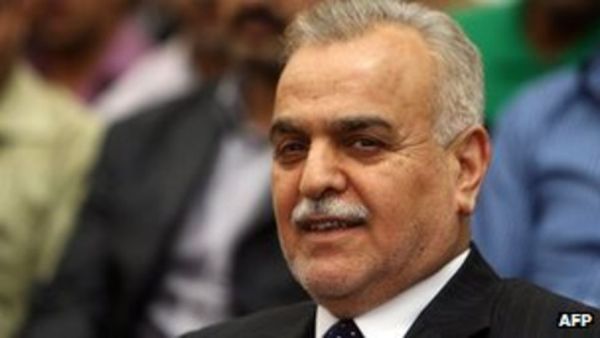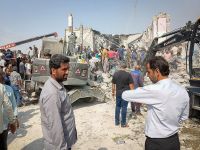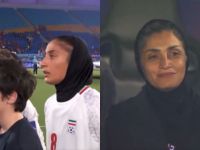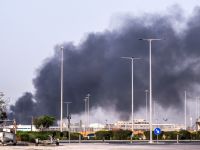Iraqi political parties close to Iran are moving to settle the files of Sunni politicians close to Turkey that have been accused of involvement in terrorist acts. Some of them have even been tried and convicted but fled the country, such as former Vice-President Tariq al-Hashemi, who has close ties with the Muslim Brotherhood movement.
Despite the sectarian and ideological differences between the Shia parties that led Iraq after 2003 and the political movements affiliated with the Muslim Brotherhood, the two sides’ interests seem to be converging.
Since the fall of the Ba’athist regime after the US invasion of Iraq, Iran has coordinated with the Muslim Brotherhood in Iraq as a matter of policy.
Analysts point out that Rashid al-Azzawi, the current secretary-general of the Islamic Party, the Iraqi arm of the Muslim Brotherhood movement, spent about half of his life in Iran, which explains his close ties to Tehran’s men in Baghdad, such as Nuri al-Maliki, Hadi al-Amiri, Falih al-Fayyadh and others.
The Arab Weekly was told by well-informed political sources that Fayyadh, the head of the Popular Mobilisation Forces (PMF), is personally making moves to conclude judicial settlements that will allow the return from exile of some Sunni political figures.
— Daunting confessions —
Among these figures is Hashemi, the former vice-president. Iraqi state television previously aired what it claimed were confessions of Hashemi’s security team, personal aides and numerous relatives that they had committed assassinations, bombings and kidnappings between 2006 and 2010 under Hashemi’s direct orders and supervision.
Iraqi political parties close to Iran are moving to settle the files of Sunni politicians close to Turkey that have been accused of involvement in terrorist acts. Some of them have even been tried and convicted but fled the country. https://t.co/UxA5B9lMU5
— The Arab Weekly (@ArabWeekly) December 7, 2020
Of all the many Sunni politicians to have been prosecuted on charges of terrorism and corruption, especially during the era of former Prime Minister Nuri al-Maliki, Hashemi is viewed with the greatest suspicion in both Sunni and Shia circles.
Hashemi is a former Iraqi army officer who was dismissed from service on suspicion of corruption. After 2003, he emerged as a senior leader in the Islamic Party and held important positions, even assuming the position of secretary-general for four years. However, he resigned from the party to run in the 2010 elections through a so-called “secular” list led by Shia liberal Iyad Allawi.
Hashemi’s move was described as political opportunism because it moved him to the unexpected position of vice-president, which would have been impossible for him to achieve without abandoning the ship of the Islamic Party.
Once vice-president, Hashemi was initially accused of using his executive powers and capabilities to carry out sectarian operations, despite his efforts to prevent these accusations from being leaked to the Sunni street. Unfortunately for him, he was never popular among the Sunnis, so when the news of an arrest warrant against him in 2011 for premeditated murder was released, there was no expression of solidarity with hom from the Sunni street.
To save his skin, Hashemi fled to Iraq’s Kurdistan region and then to Turkey, where he renewed his contacts with the Muslim Brotherhood movement and became involved in its activities.
Analysts believe that the Iranian move to bring back Hashemi and other deported Sunni political figures may be a tool to create more divisions in the Sunni body of Iraqi society, just ahead of early general elections scheduled for next summer. The elections are expected to introduce several changes to Iraq’s governance equation.
The #Iraqi prime minister's office, Mustafa al-Kadhimi, set the early #elections' date on June 6.https://t.co/yCfrjlT2sK
— Al Arabiya English (@AlArabiya_Eng) December 2, 2020
As they prepare for the ballot, Shia parties that led Iraq during the last period are not expected to enjoy the same comfortable conditions that they did in previous elections, as they can no longer hide their rule’s negative effects on all Iraqis. Even Shia voters, which these parties consider to be their electoral reservoir, revolted against them in the uprising that erupted in October 2019. In the ongoing protests, activists are condemning the ruling class and demanding it step down.
It was against this background that the process of rearranging the cards and reshaping party alliances in preparation for elections was launched, with no guaranteed results.
Iran and its followers in Iraq realise that fragmenting the Sunni political landscape is the best way to secure support of small Sunni allies, during and after the elections.
For that reason, Iran will not find a better ally than the Muslim Brotherhood to work with in Iraq, where the two parties have cooperated effectively since 2003.
Observers say that Iran is seeking to build an understanding in Iraq with Turkey, specifically its President Recep Tayyip Erdogan, to be a substitute for any understanding with the Gulf or the United States. The Iraqi Islamic Party could be an ideal gateway for this kind of cooperation.
Glad to receive a high deleg. from the Iraqi Islamic Party as We discussed str. bilateral relations, upcoming Elections & Relations between #Baghdad & #KRI reiterating the involvement of all the Ethnics comp. in Governing #Iraq & rulling according to the Constitution. pic.twitter.com/Ypgdgo371F
— Dr.Soran Jamal Taherد سۆران جمال تاهیر (@SoranJamaltaher) November 19, 2020
Despite the steady participation of Iraqi Sunni politicians in the ongoing political process in Iraq for more than seventeen years, these politicians have been unable to form an effective bloc in the governance equation, and have made no significant achievements for the social component they claim to represent. They have not succeeded in either protecting it and warding off the many dangers and harm that have befallen it, due to the many conflicts between them and their running after unequal alliances with the Shia forces in control of the reins of power for purely personal gain.
Moving against Halbousi
Recently, an internal conflict plaguing Sunni political circles again emerged as some Sunni figures became involved in efforts to remove rising Sunni politician Mohamed al-Halbousi as parliament speaker.
These efforts were led by former Iraqi Parliament Speaker Osama al-Nujaifi, who is known for his sympathies with the ideology of the Muslim Brotherhood and his close ties with Turkey.
Nujaifi has created a new political bloc that includes 35 Sunni MPs and political figures called the Iraqi Front for Action against Halbousi. Compared to Nujaifi and other veteran Sunni politicians, Halbousi has distinguished himself with his tireless political work and initiatives despite his lack of political experience.
Joining Nujaifi’s new front were well-known Sunni figures such as Ahmad al-Jubouri, Rashid al-Azzawi, Faris al-Faris, Talal al-Zubaie and Mohammad Iqbal. Political sources say that Ankara is closely working with Nujaifi to empower the new front and is offering its political experience and financial assistance to ensure its success.
This article has been adapted from its original source.










